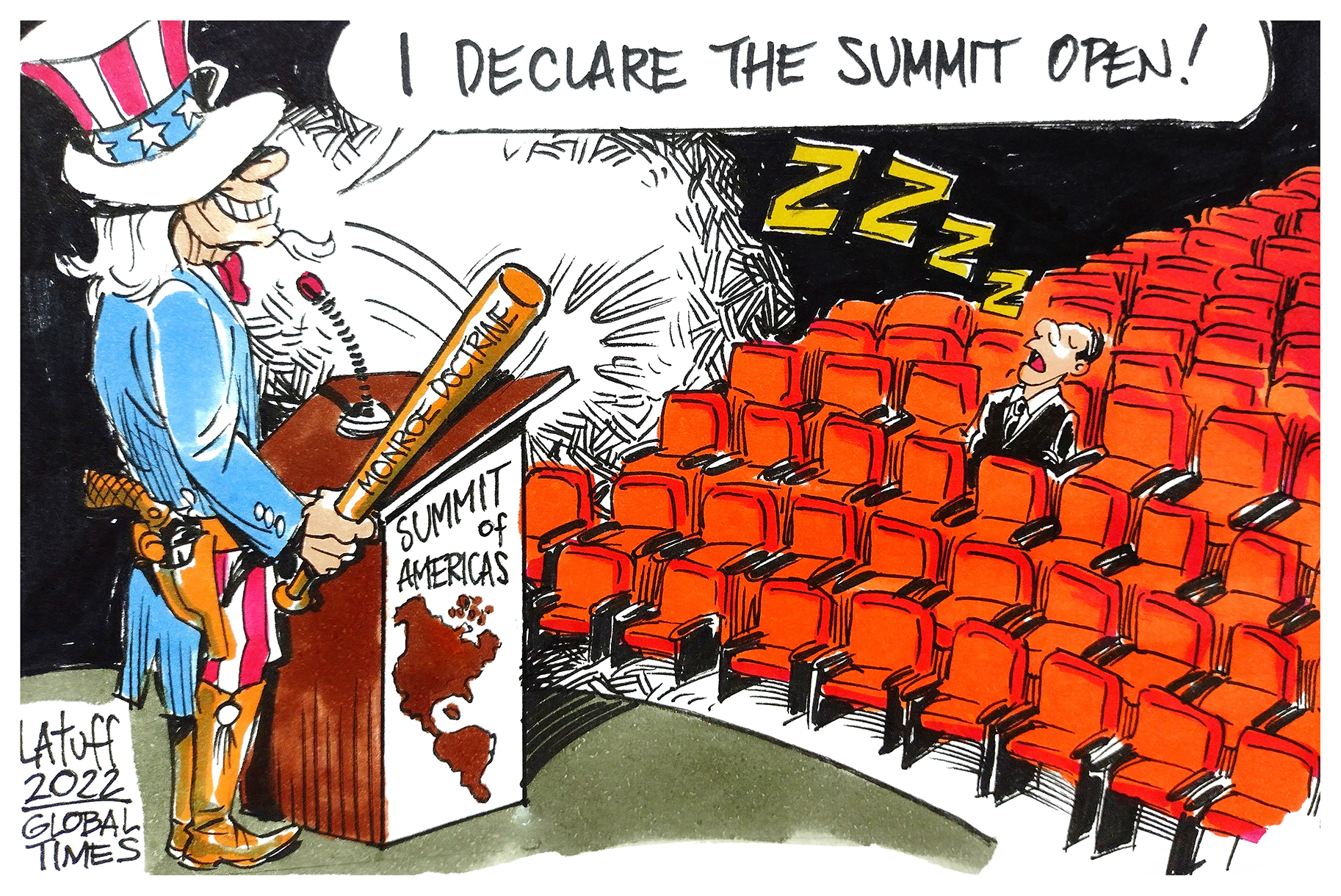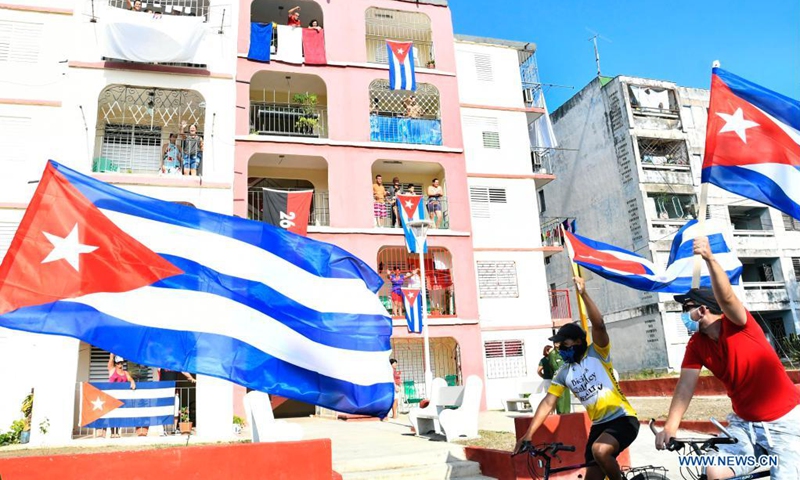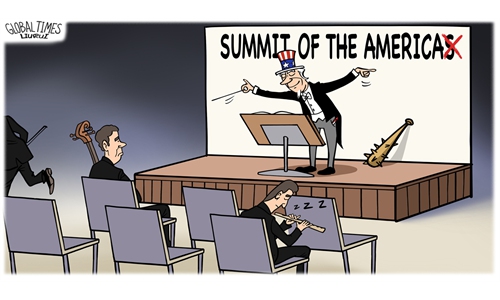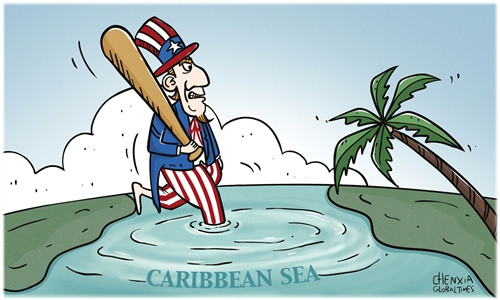
Lonely summit: Latin American countries say no to Summit of the Americas. Cartoon: Carlos Latuff
The US is scrambling to salvage the upcoming Summit of the Americas (SOA) amid a backlash over its attempt to exclude some "non-democratic leaders." Observers said it is a sign of waning US leadership and influence in the region - an inevitable result of a long history of US meddling in the internal affairs of some countries in the region while bringing apparent risks and instability.
Political activists and experts told the Global Times that the US is trying hard to make the summit a success despite boycotts, as the US hopes to reassert its influence in Latin America.
Leaders from several countries including Mexico, Bolivia, Guatemala and some Caribbean countries have threatened to boycott the summit because the US has decided not to invite the governments of Cuba, Venezuela and Nicaragua.
The week-long SOA, set to start on June 8 in Los Angeles, will bring together leaders from North, Central, and South America and the Caribbean.
But at the same time, some alternative meetings opposed to the SOA will be held.
A coalition of more than 150 organizations from the US and Latin America announced this Tuesday the "People's Summit for Democracy," which will take place next week in Los Angeles in rejection of the absence of immigration and minority issues at the Summit of the Americas that will take place on the same days, news agency EFE reported.
Manolo De Los Santos, spokesperson and organizer of the People's Summit for Democracy, told the Global Times in a recent interview that the US' controversial guest list typical of the country's "arrogant attitude toward what it considers its 'backyard.'"
"It is incomprehensible to think that these crucial issues could be addressed when such an important part of the region is being excluded. Cuba, Venezuela and Nicaragua have so many rich insights about holistic approaches to addressing key issues like social and economic inequality, climate change, building participatory democracies, and more," said De Los Santos.
The People's Summit for Democracy directly challenges the imperialist legacy of the SOA, as stated on its official website. Since its establishment in 2005, the organizers have announced diverse programs and brought together movement leaders, social activists and independence fighters, grassroots organizations and progressive people of the Americas to discuss democracy, sovereignty and change. The program has attracted Black Lives Matter organizer Melina Abdullah, the Landless Rural Workers Movement of Brazil and Guatemala's Peasant Unity Committee and some other renowned activists and social movements.
In one of this year's panel discussions, they will present their insights on the consequences of US interventions in the Americas.
Also, the Bolivarian Alliance for the Peoples of Our America (ALBA) at its 21st Summit of Heads of State in Havana denounced the US decision to ban some Latin American countries from participation in the SOA, saying the US' unilateral decision constituted a serious historic regression and an outrage for Latin American and Caribbean people.
The alliance supports the right of all countries of the continent to be invited and to participate in the event on an equal footing, and underscores that the host country has no right to impose exclusions or conditions in violation of sovereignty and independence, ALBA said in a declaration. ALBA also rejected the imposition of coercive unilateral measures against Venezuela and Nicaragua, and the economic, commercial and financial blockade against Cuba in violation of the principles and purposes enshrined in the Charter of the United Nations and international law.
Cuban Ambassador to China Carlos Miguel Pereira told the Global Times that the US, which is also the host country, put itself in a managerial role, and it tries to put pressure on other countries to achieve its own agenda. “In fact, this kind of multilateralism that the US has been advocating for is totally different from the multilateralism that we know. The US is only interested in itself,” he said.
The ambassador said that if the US still wants to take Latin America for its own backyard, such an idea wouldn’t work now because Latin America is no longer as the US had once imagined and the region has ushered in new changes.
He noted that the US’ move to exclude countries including Cuba from this summit made this summit doomed to fail. What the US is trying to achieve through this summit won’t have any real impact on the Latin America region.
He also called on regional countries to stand together to resist this external pressure and challenges.

People paticipate in a rally against US embargo in Santa Clara, Cuba, April 25, 2021. Thousands of people participated in rallies in different cities across Cuba on Sunday, demanding an end to the six-decade US embargo on the island.(Photo: Xinhua)
Boycott
There is definitely growing discontent in the region with regard to the Organization of American States (OAS). As early as 1962, the organization showed its exclusionary character when it expelled Cuba, a founding member. At the meeting held in Punta del Este, Uruguay, the OAS released a declaration stating "the principles of communism are incompatible with the principles of the inter-American system." But it became the "US Ministry of Colonies" for only a few years as former Cuban leader Fidel Castro suggested, De Los Santos told the Global Times.
Mexican President Andrés Manuel López Obrador threatened in May to boycott the meeting if Cuba, Venezuela and Nicaragua aren't included.
"Is it going to be the Summit of the Americas or the Summit of the Friends of America? Because if those countries are excluded, what continent are they from? Are they not from the Americas?" López Obrador said on May 27.
American hubris has set off a chain reaction. The leaders of Bolivia, Guatemala, Antigua and Barbuda have announced they will not attend. And others, including Chile and Argentina, have criticized the snubs.
Nicaraguan President Daniel Ortega said his government was "not interested" in attending the SOA on May 18. "This summit does not dignify anyone; rather, it dirties them, it sullies them. We Latin Americans have to defend ourselves so that they respect us."
The Nicaraguan government in April closed the Nicaragua offices of the Organization of the American States and expelled the staff, complaining of the organization's "repeated acts of meddling" in Nicaragua. The country's Foreign Minister Denis Moncada accused the OAS of being a "diabolical instrument" of "intervention and domination" by the US.
Guatemalan President Alejandro Giammattei also said on May 17 he would not attend next month's Summit of the Americas, a day after the US criticized the Central American country for appointing its attorney general to serve another term, Reuters reported.
"What if the United States held a summit and nobody came?" US media outlet Politico asked, saying that boycotts and criticisms are a signal of deep frustration in Latin America with US President Joe Biden.
What's more, the unfolding situation is "threatening to deliver a humiliating blow to the White House," according to the New York Times.
OAS meddling
Progressive and leftwing forces in the region have always viewed the OAS with suspicion and distrust, but it has also been losing legitimacy on a state level. The organization's active role in aiding and instigating the coup in Bolivia in 2019 sparked a backlash from international organizations. Secretary General Luis Almagro specifically came under serious criticism for his heavy handed role in the coup and politically motivated actions, De Los Santos told the Global Times.
As the OAS takes a more reactionary role in political affairs in the region, the distrust among regional leaders and even international bodies has only grown. Castro's assertion decades ago that it is the "US Ministry of Colonies" has grown to be widely accepted, De Los Santos noted.
The OAS was conceived in 1948 as an organization to promote peace and the settlement of disputes among member states. However, its meddling into other countries' internal affairs has never stopped since then. Its obvious role was to serve US interests.
The OAS intervened in the Dominican Republic in 1965, a classic example of a US military operation that drew in its hemispheric allies.
The OAS also interfered in Honduras' internal affairs in 2009 after a caretaker government refused to reinstate former president Manuel Zelaya, who had been toppled in a coup.
Venezuela decided to quit the OAS in 2017 while accusing the US of illegal interference in its internal affairs and violating the OAS charter by imposing sanctions.
"It reminds me of when former Venezuelan leader Hugo Chavez described the OAS as a mafia-like organization. Despite the former president's bluntness, his analysis is spot on. The OAS does not promote American solidarity, nor does it protect the sovereignty of its member states; in fact, it will interfere in the affairs of sovereign American states to sabotage those they see as non-conforming, and they will intimidate other American states to stay in line, much like how a mafioso must terrify their underlings to keep them loyal to the gang," Clayton Boylan, an independent political analyst from the US, told the Global Times.
"Nothing shows this better than the 2019 Bolivian Coup, where, against the popular support of the Bolivian people, the OAS unilaterally proclaimed that the UN-verified election results were fraudulent. Though their claim lacked any credible evidence, it was more than enough to serve as an excuse for a right-wing junta's seizure of power," Boylan suggested. "However, the coup was not condemned by the organs of the OAS; rather they gave it legitimacy."
There is an obvious trend of the US-led OAS becoming less popular among American states due to the imperialist undertones of the organization, he said. "Everyone knows that it primarily acts for US interests, and with the US' disturbing history of meddling in Central and South American affairs, many people see the organization as just a lingering shade of US interventionism."


